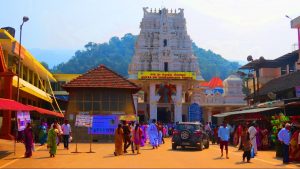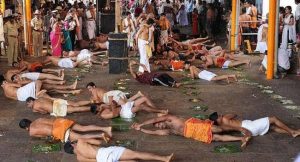Ritual Practice Madey Snana
Madey Snana is a very old ritual practiced in India, where the lower caste Hindus are made to roll over the leftovers of higher caste members in the belief that it will get rid of all their troubles and ailments.
Also known as ‘Spit bath’, this tradition is exclusive to the state of Karnataka, and is practiced mainly in the annual events of two of the most famous temples of the state, the Kukke Subramanya temple of Mangalore and the Sri Krishna temple of Udupi.
According to this century-old ritual, Dalits will have their ailments and troubles cured if they roll over the food eaten by Brahmins. This tradition is practiced every year on the annual festival of Champa Shasti/Subramanya Shasti.
Reports say that last year, more than 20,000 people practiced this ritual on their will while the district administration watched helplessly after their failed attempt to stop this practice.

Efforts were made by the district Deputy Commissioner (DC) N.S. Chennappa Gowda to ban this practice last year, who took the decision after taking into account the various protests made by local activists. But the hell broke loose on the day before the Madey Snana, as the pressure from both the Dalits as well as the Government forced the DC to lift the ban.
This pressure came especially from a section of the Dalit community, who are known as the Malekudiyas. They rallied against this ban and said that this is their ancestral tradition and that they want to follow it.
They also said that if they weren’t allowed to practice this tradition, they would no longer be a part of the event that takes place with this festival.
This tension built up to such an extent that a social activist named K.H. Shivaram was brutally beaten up for voicing against the practice. All these events resulted in the ban being lifted.
Whether the ritual violates human rights or not is another question altogether, the practice of the same cannot be stopped at the present moment if the ones thought to be oppressed by the ritual are themselves willing to take part in it with such zeal and enthusiasm.



